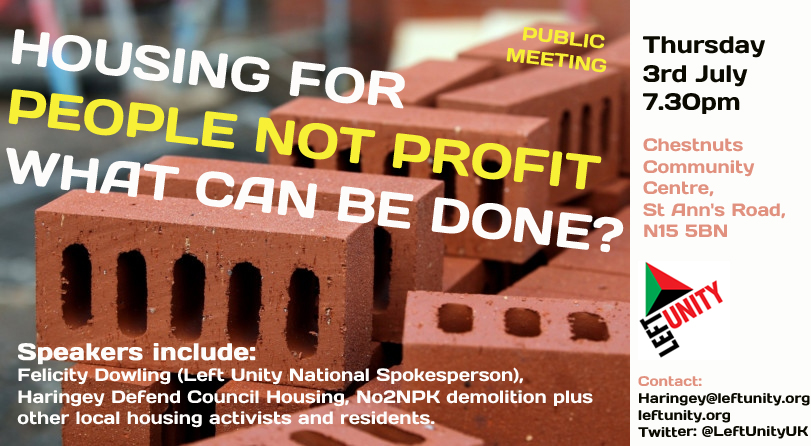Report: Left Unity Housing Public Meeting
Report from Phil Tsappas
Around 17 people attended a discussion meeting hosted by Haringey Left Unity (LU) branch: Housing for people not profit
The topic was introduced by Felicity Dowling, who is a member of Liverpool LU, and moved the housing motion at the recent LU policy conference on 29th March, 2014.
Jacob spoke about housing from the point of view of a council tenant, whose home may be facing demolition, in Tottenham – he has been active in Haringey Defend Council Housing for about a decade.
Here are some notes taken from the meeting including the discussion
- We have the smallest houses in Europe
- 700,000 empty house could house all the homeless
- London has more billionaires per head of population than anywhere else
- We need housing in the community with good local facilities
- Defend Council Housing campaigned against stock transfer
- Now there is strong pressure from the Government of up to 80% market rents
- Eric Pickles is not for social housing, he supports demolition
- Private tenants had rights (70s), landlords were thuggish. They couldn’t just move you out – now, they can give two months’ notice.
People in the room wanted to see more cooperation between campaigns, it was recognised that the Radical Housing Group have been doing a good job at achieving this. Felicity announced that a housing conference hosted by LU may take place in Liverpool early next year.
And on Thursday 10 July, campigners will gather at City Hall. It’s Time to tell those in power what we think about Boris’ housing strategy. This has been called by Housing group Our West Hendon.



July 5, 2014 - 1:46 pm
I attended this meeting and, despite the heat, thought it was well worth while. I did wonder though at the emphasis on building a million new council homes.
There certainly is a housing shortage, particularly of homes that we can afford to live in (rather than ‘Affordable Housing’ that is out of the reach of most of us) but this seemed like a bit of a one sized fits all approach when we need a more comprehensive approach.
It isn’t just the environmental damage that a mass building program like this would cause, when we’re already having difficulty with flooding for instance. But it means we’re not calling for a massive retrofitting program of existing housing, bringing back into use unused housing and, I thought, it tended to ignore that housing is being built – but it always seems to be luxury flats for the richest.
I didn’t really get a sense that there had been much thinking done yet on where these houses were going to be built – are we creating seas of housing estates or are we creating communities where people can walk to work, the shops, school? We need to get the best out of our existing housing.
Councils seem to be entirely beholden to developers driving the existing population out and making the worst aspects of gentrification deeper. I’m pleased people are talking about housing, but without being too critical I thought the ‘million new houses’ slogan was more about sloganeering than developing a policy that would work.
July 8, 2014 - 11:44 am
Tenants I’m speaking with are really angry and upset that in Haringey, Homes for Haringey, haven’t improved their homes for over 35 years. They open and close the same doors and windows their parents did from the mid 70’s.
Rather than the slogan of 1 million homes (which I agree with Jim), I tend to prefer the demand of improvements – for council/private tenants and residents, which would include the quality of the environment around our homes. For example, 1 million homes would need to include adequate infrastructure such as transport, and preferably not private modes of transport either (cars) but greener and safer ways to travel.
When thinking about it, an alternate starting point could be questions surrounding the quality of housing and how much my life could change if I had better housing conditions, which felicity did outline. it’s clear to me that the cost of living crisis is primarily in housing.
For me, then, that could mean that if we scrutinise the use of housing (permanently occupied, London holiday homes, value asset mansions/flats etc) as being for financial speculation rather than human need. We then begin to ask: How many homes are currently at a non-decent standard in Britain? how many tenants/residents can’t afford to improve and/or sustain their homes each year? And, what is to be done with the 700,000 empty homes in the UK and are they at a decent standard for people in the area to be housed
Such questions could be the start of a radical policy which involved and focussed on the very people effected by poor and no housing today in Britain.
July 10, 2014 - 9:07 am
A few weeks ago when I went into the Columbian restaurant just next to Seven Sisters station, there was a celebration going on and it wasn’t the World Cup. That restaurant and market had been under attack for many years – I think 2007 – over demolition of the market and the loss of the business. It would have been a massive blow to the wider community not just the Colombian community.
I spoke to a community member there and asked what had happened. What they said that they had put their own counter plans for re-generation not gentrification and they had won – hence the champagne and free food. I have also been chatting with a resident from Broadwater Farm who is interested in Green/Eco politics and sends me radical ways to change transport and architecture in London.
Wouldn’t it be an idea, if putting an argument about what kind of community/society we want to leave in, it would be good to present an alternative. I’m sure there are lots of talented people in the community; housing campaigns, save the park campaign etc – who may have vision of what they want their community to be like and would want to be involved.
Just an idea.
July 10, 2014 - 9:47 pm
Is this Mitcham’s Corner? I’ve heard good things about the group there.
I think you’re right that we need to get better at presenting positive alternatives. From a vision for a different society right over to an alternative plan for redeveloping specific blocks and estates.